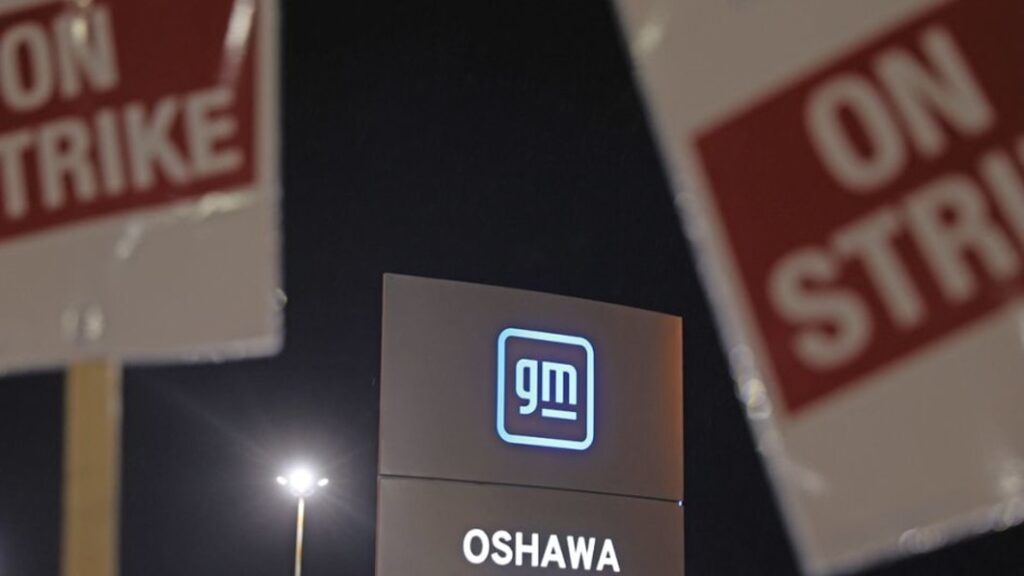UAW reaches deal with GM, ending coordinated strike against Detroit automakers

General Motors and the United Auto Workers (UAW) union have reached a tentative agreement, two sources familiar with the matter told Reuters, effectively ending the first simultaneous strike against the Detroit Three automakers with record wage and benefit hikes.
Details of the agreement with GM, the last holdout of the Detroit Three, were not immediately available.
The accord follows agreements reached in the last few days by the union with Ford Motor and Chrysler owner Stellantis in what experts say stand as significant victories for auto laborers after years of stagnant wages and painful concessions made by the union following the 2008 financial crisis.
Nearly 50,000 workers out of nearly 150,000 union members at the Detroit Three eventually joined a series of walkouts that began on Sept. 15. The UAW’s strategy of escalating, targeted strikes cost the Detroit Three and suppliers billions of dollars over more than 40 days.
The GM workers will return to work after an official announcement of the agreement, two sources said.
A GM spokesperson declined comment.
Talks at GM stalled Saturday because of issues such as pension and how fast temporary workers would get permanent work, sources have said.
At about 5 PM ET on Saturday, UAW workers at the Spring Hill complex began walking off the job, even as UAW President Shawn Fain and the UAW’s top negotiator at Stellantis, Rich Boyer, were preparing to announce terms of the contract at the Chrysler parent.
The three tentative deals are a win for the precedent-breaking strategy that Fain and top union officials orchestrated to achieve their goal of securing record-setting pay and benefit gains.
Fain must now get the contracts ratified by rank-and-file UAW members. That process began on Sunday as Fain met with leaders of Ford-UAW local unions.
For the first time, the UAW bargained with all three automakers at the same time, using the threat of strikes at key factories to accelerate a bidding war among the companies to avoid a new walkout.
Fain kept most UAW members working in order to hoard strike funds. He expanded the strike slowly, when he decided that progress in talks had stalled.
Fain repeatedly accused the Detroit Three automakers of enriching executives and investors, while neglecting workers and said the UAW’s success would help blue collar workers throughout the country.
Shares of GM were up 0.9% in Monday trading. Ford shares fell 0.7% while Stellantis shares were flat in Milan.
The UAW Strategy
The strike began at relatively unimportant plants, spreading to the biggest money-makers that produce pickup trucks and SUVs, ratcheting up the pain.
Momentum toward deals accelerated over the past two weeks after UAW workers walked out at three of the most profitable factories in the world: GM’s Arlington, Texas, assembly plant, which makes the Chevy Tahoe and Suburban; Ford’s Kentucky Truck heavy-duty pickup factory and Stellantis’ Ram pickup plant in Sterling Heights, Michigan.
The UAW eventually struck against nine plants, most recently GM’s Spring Hill, Tenn. manufacturing complex with makes engines for a total of nine North American assembly plants, seven of which were not already on strike.
The UAW achieved substantial gains in pay and retirement benefits, and rolled back concessions on other issues it agreed to in contracts over the past 15 years.
The Detroit automakers argued that the UAW’s demands would significantly raise costs and put them at a disadvantage compared with EV leader Tesla and foreign brands such as Toyota Motor, which are nonunionized.
Both GM and Ford recently said they would slow their EV buildouts as demand for these cars has slowed. (Reporting by David Shepardson in Washington and Joseph White in Detroit Editing by David Gaffen, Peter Henderson and Matthew Lewis)



